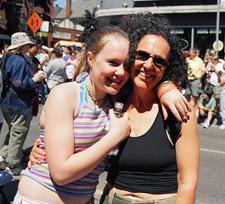Thirty years ago most of the lesbians with balls enough to fight for judicial custody of their children lost. Most gay men wouldn’t even have conceived of becoming parents, let alone attempted to argue in court for their rights to custody of children they may have already fathered in straight relationships. Thirty years ago trans parents weren’t on anybody’s horizon but their own.
Thirty years ago Rachel Epstein wasn’t thinking a whole lot about parenting either, at least not about becoming a queer parenting pioneer. But Epstein — editor of Who’s Your Daddy?, a new anthology on queer parenting — has been hugely responsible for the advancement of queer parental rights and supports in Canada. Earlier this year, Epstein was honoured for her work with the 2008 Steinert and Ferreiro Award from the Community One Foundation (formerly the Lesbian and Gay Community Appeal), arguably the most significant recognition of queer activism in Canada.
Being a mom is something Epstein always expected to do and on the anything-is-possible west coast she was fortunate enough to encounter a group called the Lavender Conception Conspiracy — an informal gathering of lesbians who shared info and encouragement on becoming parents.
“When I left Vancouver I came to Toronto already knowing that there were ways for lesbians to get pregnant,” says Epstein from her vibrantly postered office as coordinator of a Toronto queer parenting network. “I also knew it was a perfectly okay thing for me to do.”
Epstein and coparent Lois Fine’s daughter Sadie was born at home in 1992. Since then Epstein has put the reality, concerns, challenges and joys of queer parents on the map and in the public eye through activism and research, not to mention a 2005 Charter challenge that resulted in changes to birth registrationin Ontario.
In 1997, along with midwife Kathie Duncan, Epstein developed and delivered the first Dykes Planning Tykes course and, with the 519 Community Centre a few years later, helped to develop Daddies and Poppas 2B. Not long after that came Trans Fathers 2B, a course for trans men.
And let’s not forget the kids. Epstein has spearheaded innovative research with the “spawn” of queer parents to find out about the particular challenges they face.
Tired of continually answering arguments about whether or not queers make good parents (while making dinner, changing diapers, helping with homework and diversifying gender in all the bedtime stories) Epstein decided it was time for an anthology about issues beyond that inane question.
“That’s all we’ve been able to talk about publicly because that’s the framework in which we live,” she says, citing a 2002 Alabama court decision that denied a lesbian custody of her children in favour of a violent father on the grounds that homosexuality is “abhorrent, immoral, detestable… an act so heinous that it defies one’s ability to describe it.”
“I didn’t want to have to respond to those accusations anymore,” says Epstein, “so I decided to put together an anthology and invite [lesbian, gay, bi, trans and questioning] parents and their spawn to write about real issues in their lives.”
The result is a hefty volume of more than 30 essays and interviews — including contributions from Makeda Silvera , Ann-Marie MacDonald, Elizabeth Ruth, Emma Donoghue, John Greyson and (humbly in the same company) myself — on topics such as the complexities of creating a queer family, challenges in adoption, mixed-race families, how to queer up kids’ picture books, dealing with the medical system, the experiences of donor dads, legislative recognition and biological connections versus love. It looks to be a must-read for anyone interested in contemporary queer parenting in Canada and, well, maybe especially for those who aren’t.
Catch the Ottawa launch of Who’s Your Daddy? on Oct 18 at 4pm. Mother Tongue Books, 1067 Bank. Sponsored by the Ten Oaks Project and the Around the Rainbow.

 Why you can trust Xtra
Why you can trust Xtra


